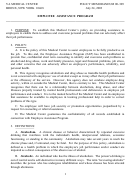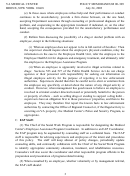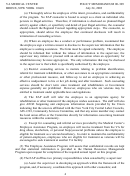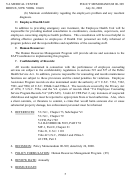Equal Employment Opportunity (Eeo) Policy And Program Administration Form Sample Page 29
ADVERTISEMENT
VA MEDICAL CENTER
POLICY MEMORANDUM 00-304
BRONX, NEW YORK 10468
July 31, 2003
leave balances of the employee. When a PCCD/Program Chief recommends approval
of LWOP of more than thirty calendar days, a form SF-52, Request for Personnel
Action, will be forwarded, along with the LWOP request, to the approving official.
The Associate Director or Chief of Staff will make the decision on the request.
(c) The Medical Center Director will approve or disapprove requests for LWOP for
periods of thirty (30) calendar days or less for employees occupying centralized
positions. Requests in excess of thirty (30) calendar days for employees occupying
centralized positions will be forwarded to VA Central Office.
IV.
Return to Duty: When an employee returns to duty from LWOP originally
scheduled for more than thirty days, the employee’s supervisor will assure that an SF-52
for the Return to Duty is prepared and promptly received by HRMP, in order to assure the
employee will receive a paycheck on the appropriate payday after the return to duty.
E.
LEAVE WITHOUT PAY UNDER THE FAMILY AND MEDICAL LEAVE ACT
(FMLA)
I. ELIGIBILITY: FMLA applies to all full-time and part-time General Schedule,
Federal Wage System, and Title 38 employees who have completed twelve (12) months of
service. Employees serving on temporary appointments limited to one year or less are not
eligible for FMLA leave.
II. POLICY:
(a.)
Supervisors and managers will allow employees to balance their work and
family life by approving reasonable amounts of leave requested by employees under
the FMLA.
Under the Law, employees are entitled to a total of twelve (12)
administrative workweeks of unpaid leave during any twelve- (12) month period
(employees in recognized bargaining units should familiarize themselves with any
negotiated variations from the legal entitlements). Leave under the FMLA may be
requested for the following reasons: 1) serious health condition of the employee, that
makes the employee unable to perform the essential functions of his or her position; 2)
the birth, adoption, or foster care of a child; or 3) the care of a child, spouse, or parent
who has a serious health condition.
(b.)
Employees will not suffer the loss of any employment status, tenure, or benefit
to which they would otherwise have been entitled as a result of taking leave under the
FMLA.
III.
DEFINITIONS:
(a.) Family Member: [Note that these definitions differ from those for Family
Friendly Leave.] For the purposes of the FMLA — Son or daughter means a
biological, adopted, or foster child; a step child; a legal ward; or a child of a person
standing in loco parentis who is 1) under 18 years of age, or 2) 18 years of age or older
and incapable of self-care because of a mental or physical disability. In loco parentis
refers to the situation of an individual who has day-to-day responsibility for the care
and financial support of a child, or, in the case of an employee, who had such
responsibility for the employee when the employee was a child; a biological or legal
relationship is not necessary. Parent means a biological parent or an individual who
stands or stood in loco parentis to an employee when the employee was a child; this
7
ADVERTISEMENT
0 votes
Related Articles
Related forms
Related Categories
Parent category: Legal
 1
1 2
2 3
3 4
4 5
5 6
6 7
7 8
8 9
9 10
10 11
11 12
12 13
13 14
14 15
15 16
16 17
17 18
18 19
19 20
20 21
21 22
22 23
23 24
24 25
25 26
26 27
27 28
28 29
29 30
30 31
31 32
32 33
33 34
34 35
35 36
36 37
37 38
38 39
39 40
40 41
41 42
42 43
43 44
44 45
45 46
46 47
47 48
48 49
49 50
50 51
51 52
52 53
53 54
54








